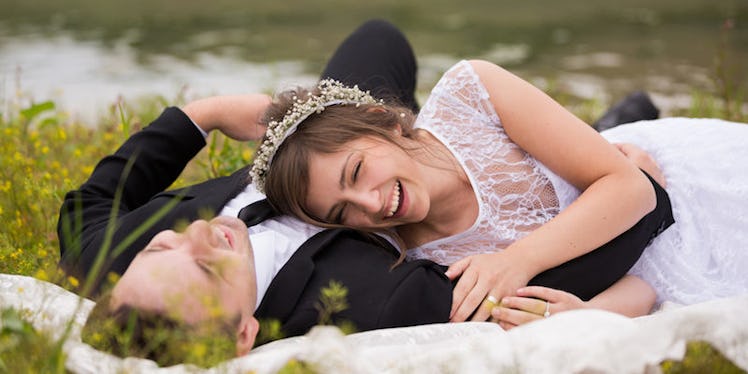
Why You Won't End Up Marrying Someone Who's Your Type
Growing up, I've always had a type. She was brunette, had dark, exotic features and dressed like Nicole Richie after the first season of The Simple Life. Then, ideally, she'd have tattoos and a career in a creative field.
But while this was my carefully selected “type,” I usually dated the opposite. The women I'd date were blonde, blue-eyed and dressed very pedestrian, opting for Abercrombie, American Eagle and Forever 21. Basically, she dressed like everybody else. Until I met my fiancée.
She had everything I ever wanted in a woman and then some. She's tattooed, brunette and works as head baker and recipe developer at an award-winning vegan bakery. In a way, I'd hit the jackpot. My own archetypal jackpot.
According to research, however, I'm one of the lucky few, as science has determined having a type is BS. A study conducted by the University of Western Ontario ultimately deduced that most people don't end up marrying their type.
Instead, something called “revisionist history” occurs, in which people start dating somebody they like and their preferences change to match the traits of the person they're dating.
While this does sound possible, I'm not quite convinced. To say something so prevalent doesn't exist with such a simple conclusion doesn't seem right. So I decided to do some investigating myself.
Using social media as my guide along as well as a few crowdsourcing resources, I asked 38 married men and women, aged 24 to 60, if they married their type.
More than two-thirds of participants did not marry what they considered their type when surveying the singles landscape. Instead, they either compromised in a few areas or dated outside their type altogether.
Many did admit their type changed when they met their partner (aka revisionist history, as cited earlier), and that really didn't help support my case. But my favorite response I received did. Kind of.
Kimberly, 33, said:
I married my “type” last October, after dating for five years. I had a very, very specific type that got more narrow as I got older. It started out as just dark hair and tattoos, musician a plus. As time when on, it morphed to hobby musician, with a full time job and a little bit nerdy. I got tired of the “cool” guys, but still wanted the look. (Making generalizations here, obviously!). Where did I find my dark haired, tattooed, hobby musician? Through friends. Why'd I fall for him, besides the looks and the stage presence? The nerdiness. It's a really attractive combination, having an intellectual passion really balances the bad boy rocker, in a way that just gets to me.
As it turns out, Kimberly did marry her type — she just had to compromise in a few less important areas. Her man was indeed a rocker, but also kind of a nerd, and when she him and got to know him better, she started to find this nerdiness — a quality she never sought prior — fiercely attractive.
So here's my take: When you're young (and admittedly naive), this picture of Prince/Princess Charming is a fairy tale painted in very detailed, graphic strokes. But as we age, mature and reality sets in, we understand that we can't pick and choose our own significant other, and compromise in areas that aren't as important as others.
In other words, the strokes become broader. The fairy tale gets less specific.
So if we don't marry our type, why the hell do we have one in the first place? I expressed this idea to Renee Slansky, television personality and relationship expert, who believes having a type comes from a few influences: “One is the way in which we were subjected to other relationships through the modelling of parents or people in our lives as we grew up.”
Slansky says we usually end up marrying somebody similar to our mother and father because they are, understandably, the strongest of influences. “It's also part of our genetic makeup and personality to crave certain qualities in another person,” she adds.
Slansky is a firm believer that our type isn't definite, but that it matures as we do (after experiencing bad relationships, different settings, stages in life, etc.). “As we grow and learn more about ourselves, our desires in another person can change and develop and often the original type of person we wanted can now be completely different two years down the track," she says.
Slansky believes our type should act as a guideline, instead of a definite black and white checklist.
“I think people should stick to their type, but perhaps not expect that person to have every single thing they have always wanted," she says.“Having a clear idea of what you want and what a relationship needs to be happy and successful is very important. If we can paint a clear picture in our head of the type of man or woman we would like to be with, it helps give us an idea of what areas we are willing to compromise on and which we simply can't.”
She concludes that having a type is about understanding the qualities that make us compatible with someone else, not just selfishly listing qualities we want.
When I set out to write this piece, I'll admit I wanted a different conclusion. I wanted to say the majority of us married our type and that you should never compromise because you shouldn't have to. But that's not the world we live in.
As is usually the case, the researchers are correct: Our type does change when we meet the person we want to spend our lives with. While the compromising we do will always be subjective and alter from person to person, having a type isn't redundant. It helps us better understand ourselves and what we deserve.